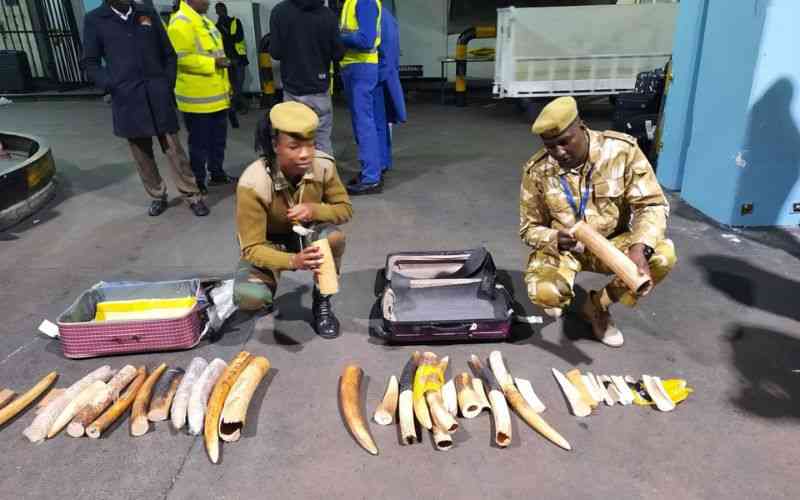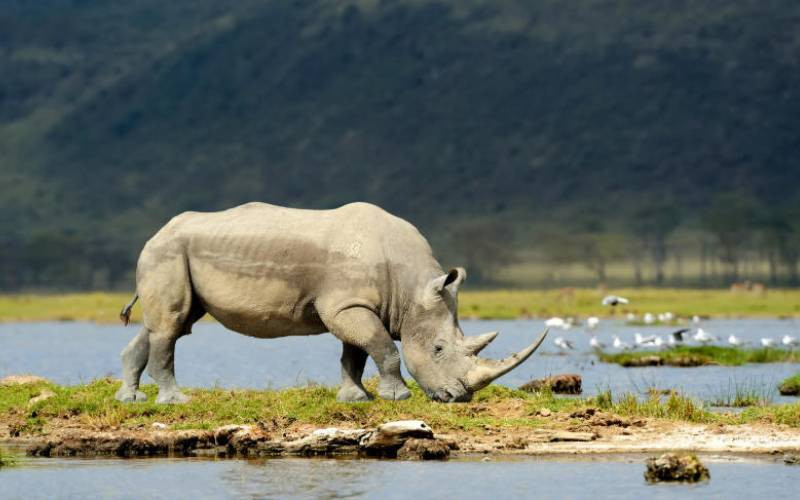By Issac Kalua
NAIROBI, KENYA: We are now witnessing accelerated demise for elephants, not to the ultimate call of nature but to poaching, the ultimate call of greed. For instance, over the last 10 years, Zakouma National Park in Chad has lost at least 90 percent of its elephants.
Just last year in 2012, Kenya lost 384 elephants and 29 rhinos to poaching. This year, we have lost 190 elephants and 34 rhinos.
The situation was worse last year in Cameroon when heavily armed poachers entered the Bouba N'Djida National Park in northern Cameroon killing over 450 elephants. Tragic as this was, it was even more heartbreaking between 1979 and 1989 when half of Africa’s elephants were killed for their ivory! Totally unconscionable and unpardonable.
These are not just statistical numbers. They are gigantic elephants that once roamed in colossal grace but are now falling under immense onslaught.
They are mostly felled for their ivory, which fetches anywhere from Sh85,000 to Sh425,000 per kilo. Although ivory trade was banned in 1989, this hasn’t stopped poachers and their clients from conspiring to kill elephants because of the ivories that dangle from their gentle faces.
In 1989, the U.N. Convention on International Trade in Endangered Species of Wild Fauna and Flora (CITES) stopped right in front of poachers and gave a clear, legal and global command – STOP! CITES moved elephants from Appendix II to Appendix I, in effect banning all international trade in elephants and their parts and derivatives.
But despite this commendable action, ivory is still finding its way from Africa to Asia and other parts of the world with alarming regularity.
In Asia, people associate elephant ivory with good luck and high class. This is bad luck for the elephants because Asia has two of the world’s most populous nations in China and India.
What then can we do about this totally tragic poaching of elephants? The first thing is to know what is happening to elephants and why it is happening. This letter has already shed some light into that. The second thing is to act on our knowledge.
If you are sitting on a railway line and you know that a train is hurtling towards the very spot where you are sitting, you better act on your knowledge and jump out of the railway or you will be crushed to death.
Now that we know that poaching is racing towards elephants, we better act on this knowledge or the elephants will be poached into extinction territory.
The foremost action must come from the thousands of ivory customers in Asia. They must STOP buying ivory. We respect any cultural attachment that they may have to ivory but we abhor the grisly slaughter of elephants that seeks to quench this ivory thirst.
Our message to these ivory customers is this, “ivory may grant you tickets into the high class of your societies, but ivory purchases also leave you with the indelible stain of elephant blood”.
In the same vein, “ivory may leave you with a feeling of good luck, but ivory purchases also leave you with the indelible stain of elephant blood.’ China accounts for at least 50 percent of global ivory consumption and must take action to stop ivory trade”.
Stay informed. Subscribe to our newsletter
Action must also come from African governments through elephant-friendly legislations and full implementation of the said legislation. Kenya government’s new bill – the Wildlife Conservation and Management Bill – provides holistic solutions that will go a long way in curbing poaching if implemented. But more must be done.
Radical times call for radical solutions. Maybe the army should be engaged in combating poachers so that the very thought of poaching brings shivers down the spines of potential poachers.
However, such government action can only gain traction through spirited civil society and private sector action. Kenyans like Dr Paula Kahumbu the Executive Director of the Kenya Land Conservation Trust and WildlifeDirect are spearheading efforts to conserve elephants and wildlife as a whole.
At my organization the Green Africa Foundation, we are working on Green Africa Villages that facilitate conservation and empowerment at the grassroots level. A Facebook group known as Kenyans for Wildlife is also playing its role in this conservation journey.
Indeed, the more Africans tread down the sustainable conservation path, the more they will embrace the economic empowerment that comes from natural capital.
Let’s keep our elephants alive and kicking as we kick out poaching.
 The Standard Group Plc is a
multi-media organization with investments in media platforms spanning newspaper
print operations, television, radio broadcasting, digital and online services. The
Standard Group is recognized as a leading multi-media house in Kenya with a key
influence in matters of national and international interest.
The Standard Group Plc is a
multi-media organization with investments in media platforms spanning newspaper
print operations, television, radio broadcasting, digital and online services. The
Standard Group is recognized as a leading multi-media house in Kenya with a key
influence in matters of national and international interest.
 The Standard Group Plc is a
multi-media organization with investments in media platforms spanning newspaper
print operations, television, radio broadcasting, digital and online services. The
Standard Group is recognized as a leading multi-media house in Kenya with a key
influence in matters of national and international interest.
The Standard Group Plc is a
multi-media organization with investments in media platforms spanning newspaper
print operations, television, radio broadcasting, digital and online services. The
Standard Group is recognized as a leading multi-media house in Kenya with a key
influence in matters of national and international interest.









